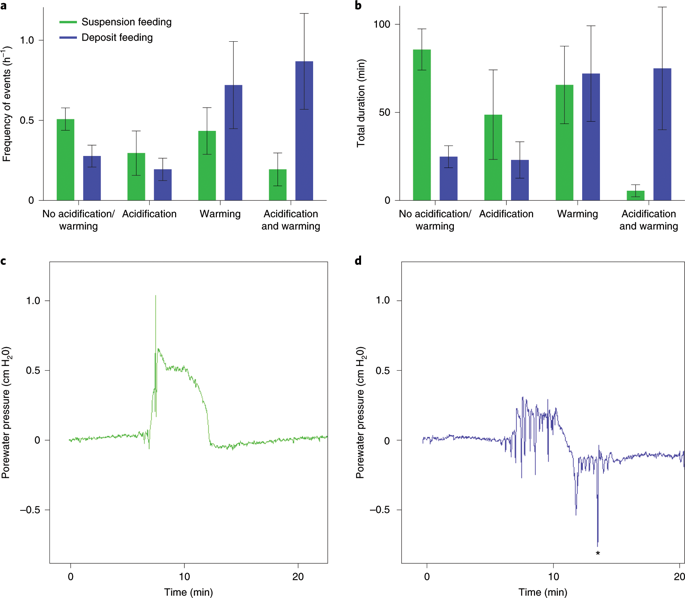Nature Climate Change ( IF 29.6 ) Pub Date : 2020-01-20 , DOI: 10.1038/s41558-019-0679-2 Carl Van Colen , Ee Zin Ong , Mark Briffa , David S. Wethey , Emmanuel Abatih , Tom Moens , Sarah A. Woodin

|
Ocean warming and acidification affect species populations, but how interactions within communities are affected and how this translates into ecosystem functioning and resilience remain poorly understood. Here we demonstrate that experimental ocean warming and acidification significantly alters the interaction network among porewater nutrients, primary producers, herbivores and burrowing invertebrates in a seafloor sediment community, and is linked to behavioural plasticity in the clam Scrobicularia plana. Warming and acidification induced a shift in the clam’s feeding mode from predominantly suspension feeding under ambient conditions to deposit feeding with cascading effects on nutrient supply to primary producers. Surface-dwelling invertebrates were more tolerant to warming and acidification in the presence of S. plana, most probably due to the stimulatory effect of the clam on their microalgal food resources. This study demonstrates that predictions of population resilience to climate change require consideration of non-lethal effects such as behavioural changes of key species.
中文翻译:

蛤蜊喂养可塑性降低了食草动物对海洋变暖和酸化的脆弱性
海洋变暖和酸化影响物种种群,但社区内的相互作用如何受到影响以及这如何转化为生态系统功能和恢复力仍然知之甚少。在这里,我们证明实验性海洋变暖和酸化显着改变了海底沉积物群落中孔隙水养分、初级生产者、食草动物和穴居无脊椎动物之间的相互作用网络,并与蛤蜊Scrobicia plana的行为可塑性有关. 变暖和酸化导致蛤蜊的摄食模式从环境条件下的主要悬浮摄食转变为沉积物摄食,并对初级生产者的养分供应产生连锁效应。在S. plana存在的情况下,生活在地表的无脊椎动物更能耐受变暖和酸化,这很可能是由于蛤蜊对其微藻食物资源的刺激作用。这项研究表明,预测人口对气候变化的适应力需要考虑非致命影响,例如关键物种的行为变化。











































 京公网安备 11010802027423号
京公网安备 11010802027423号